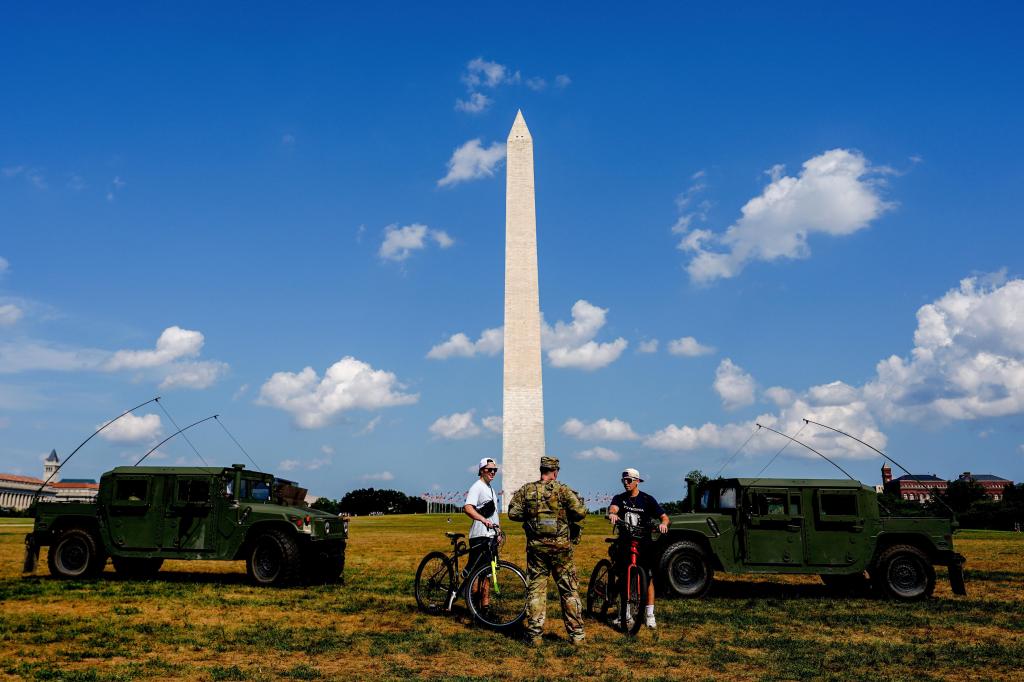
The deployment of the National Guard to American cities in order to combat surging crime embodies much of Donald Trump’s presidency.
Indeed, President Trump often correctly diagnoses a problem that worries voters, then proposes a solution that, while potentially excessive, leaves Democrats unable to effectively oppose it.
Put another way, while the use of federal troops to combat crime may be heavy-handed and there are political risks to both Trump and Democrats, the latter finds themselves painted into a corner.
For the former, Trump risks compounding concerns that he is bringing chaos and dysfunction – which a majority (51%) of voters agreed with in Wall Street Journal polling.
At the same time, Democrats find themselves in an even more difficult situation: how do they oppose Trump’s moves without being seen as soft on crime?
Unfortunately for Democrats, they appear to be walking right into what Trump himself has called “a trap.” It’s likely that Congressional Republicans will force a vote on extending Trump’s police power in Washington, and according to Politico, the GOP is giddy on the prospect.
Getting Democrats on the record opposing Trump’s efforts will allow Republicans to “pummel Democrats on the campaign trail as soft on crime” but Democrats show no sign of any effort to rid themselves of the image that they are soft on crime.
Two Democratic governors – Kathy Hochul of New York and JB Pritzker of Illinois – have come out with statistic-laden statements attempting to show that crime in their states is down or that it is not at “emergency” levels necessitating the National Guard.
And yet, no matter how many times these officials repeat the claims, voters simply do not feel safe. If that means accepting political overreach by the administration, national voters will likely tolerate – or even applaud – Trump’s solution.
Crime is a very real issue in many cities, and these governors’ declarations to the contrary reinforces the idea that, once again, Democrats are running the risk of being on the wrong side of an 80-20 issue.
At the same time, Hochul, Pritzker and to some extent, Gov. Gavin Newsom, risk repeating a mistake former President Joe Biden repeatedly made: telling voters that something is not a problem when they clearly feel that it is.
The nonpartisan National Survey on the American Criminal Justice System found that nearly three-quarters (73%) of Americans say crime has had “some” or a “major” impact on how they live their lives.
Even in deep-blue California, crime had become such a problem that last November, voters in the state overwhelmingly passed (68% to 32%) Prop. 36, increasing sentences for certain offenses.
Moreover, polling repeatedly shows that crime is a unique vulnerability for Democrats.
Two separate polls, one from CNN and the other from YouGov reveal that by 13-point and 12-point margins, respectively, voters trusted Republicans over Democrats to handle crime, the party’s worst testing issue in both surveys.
On this, California is no exception. Newsom and LA Mayor Karen Bass have already struggled to overcome national perceptions that their leadership has facilitated a crime crisis.
And in separate years, as a crime epidemic gripped the city, voters in San Francisco recalled the progressive District Attorney and voted out a progressive mayor in favor of candidates who prioritized improving public safety.
With this in mind, there are risks for Trump as well.
According to a separate Economist/YouGov survey, a plurality (48%) of adults – including a majority (51%) of Independents – disapprove of deploying the National Guard and federalizing the city’s police force.
For Southern Californians, events in Washington likely conjure up all too familiar feelings.
Earlier this Summer, Trump sent National Guard soldiers, backed by U.S. Marines to Los Angeles in order to combat crime, specifically assaults on immigration officials, leading to chaos in the streets.
Similarly, with the White House warning that Chicago is the next target for a federal crackdown on crime – and California’s Gov. Gavin Newsom ramping up his own fight with Trump – there is a very real chance that Los Angeles follows the Windy City.
As the nation’s second largest metro area and one hosting a number of national and international events in coming years, a showdown in Los Angeles would put Democrats, and Newsom in particular, in an even tricker spot.
Opposing Trump could easily be seen as defending criminals, hurting Newsom’s viability in a general election.
Alternatively, siding with Trump would be a significant blow to his hopes in a Democratic primary, where progressives and other left-wing voters dominate.
Ultimately, there is a roadmap for Newsom and other Democrats on how to thread this needle.
When Republicans accused former President Bill Clinton of being soft on crime almost 30 years ago, Clinton countered with calls for 100,000 more police officers to patrol American streets.
It’s hard to imagine any Democrat doing that today, fearful that they would be criticized by the progressive wing, but that is the most politically palatable path forward.
Democrats could also publicly agree that crime is a genuine problem and offer middle-of-the-road solutions like bail reform or empowering district attorneys to increase sentences for a wide range of crimes, but the party continues to double down on reflexively opposing Trump regardless of the issue.
Douglas Schoen is a longtime Democratic political consultant.



